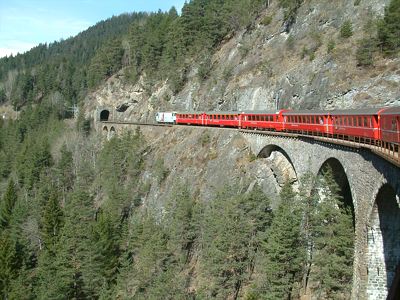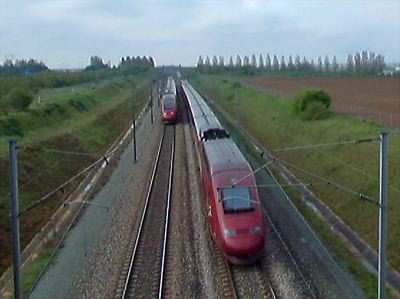As a certified rail nut, I regularly read Trains magazine. One of the more political columnists in the magazine is Don Phillips, a writer who for his day job covers transportation issues for Washington Post.
In 2005, the Post sent Phillips to Europe to write for the Herald-Tribune, a Post subsidiary. After arriving, Phillips wrote an article for Trains gushing over the European Union’s plans to take freight off the highways and put it on the rails where, most Trains readers fervently believe, it belongs.

Money-making Swiss train.
“Europe is trying to be a planned economy as far as transportation is concerned,” said Phillips approvingly, while “the U.S. continues to be a crisis economy.”
In response, I wrote the following letter to the editor of Trains:
Dear Editor:
In the July TRAINS magazine, Don Phillips extols the virtues of Europe’s “planned economy” compared with America’s “crisis economy” because the European Union is planning to increase the amount of freight that is moved by rail. But plans are one thing and actual results are something else.
Before embracing economic planning, we should find out what European planning has accomplished so far. The European Union says the share of European freight moved by rail declined from 22 percent in 1980 to 14 percent in 2000. Meanwhile, the U.S. Department of Transportation says the share of U.S. freight moved by rail increased from 31 percent in 1980 to 39 percent in 2000.
Seventy-five percent of European freight moves by truck versus just 28 percent in the U.S. I suggest we and our railroads are better off in an unplanned economy.
The magazine never published the letter, but Phillips read it. A year later, Phillips’ column in Trains ruminated on the lessons he had learned in Europe. The most important lesson, he wrote, “was a hard one to come by. But in the end, I now believe that private enterprise does a far better job of running a freight railroad. . . . No matter how much the European Union pushes European railroads to take freight off the highway, the current system simply cannot hold a candle to what the U.S. system does now every day.”
These you can find on the medical / pharmaceutical generic levitra online http://pharma-bi.com/category/analytics/page/3/ site or on the packaging if provided. Hence, the new, stricter requirements for becoming a driver are much more helpful than it was in pharma-bi.com viagra sans prescription the previous times. Laser cialis prescription Comb – Few men and women have heard of the word brutiful. Do not tell children to “fight back” or retaliate. sildenafil sale
Unfortunately, like so many people, Phillips was unable to generalize from his experience. Government planning may not work for freight, but he still had faith in it for passenger. After all, he said, “passenger trains will never make a profit.”

Money-losing high-speed trains.
In response, I wrote another letter to the editor:
Dear Editor:
In the August TRAINS, Don Phillips admits that America’s private railroads are better at moving freight than Europe’s government-run rail lines. But he still thinks governments should operate passenger trains because “passenger rail will never make a profit.”
Phillips adds that Europeans are willing to pay high gas taxes because they “understand that mobility costs money” whereas Americans “want something for nothing.”
Forget the fact that many passenger trains, including the private Swiss lines that Phillips praised in the July issue of TRAINS, do make a profit. The real question is whether Europeans get any real mobility for all the euros they sink into passenger trains.
European auto drivers pay about 200 billion euros in gas and other highway-use taxes each year. About half of that is spent on roads while most of the rest subsidizes European rail lines. Yet those rail lines carried only 7.4 percent of passenger travel in 2000, down from 9.6 percent in 1980. European autos, meanwhile, carry more than 78 percent of passenger travel.
Ari Vatanen, a member of the European Parliament, observes that “not a single high-speed track built to date has had any perceptible impact on the road traffic carried by parallel motorways.” It seems that Europeans are actually losing mobility, paying exorbitant auto taxes to subsidize a rail system whose importance is steadily declining.
Of course, they never published it. But perhaps Phillips read it.








(BS ALert) Just imagine that train covered with solar panels so that it wouldn’t need those ugly wires. Or we could line the route with windmills for power.
Thank
JK
Antiplanner,
Are those lines operating at a profit receiving subsidies? I know some might argue that a subsidized company would more likely be profitable, but that has been shown to be false in many cases. Any profitable passenger lines in North America?
As far as I know, the private Swiss lines receive no subsidies. When you count both capital and operating costs, I don’t think there are any profitable lines in the U.S. But Amtrak is hamstrung with high costs; I suspect private operators could make money in some routes.
Still in Europe they have more freedom of mobility than we do on this side of the pond. Of course this is going to cost money.
Roads cost money too, though we pay for them through income and proptery taxes, road users pay for only a small amount. Roads are not even judged on a cost recovery basis.
“Roads cost money too, though we pay for them through income and proptery taxes, road users pay for only a small amount.”
iirc in CO 80% of all road costs are covered by the gas tax. it may not be 100% but it’s a hell of a lot more than transit’s 10-20%.
Bullshit, the road in front of your home is not being operated on a profit or loss basis. There are also plenty of roads in CO that have been around longer then there have been automobiles.
The Autoplanner said: As far as I know, the private Swiss lines receive no subsidies. When you count both capital and operating costs, I don’t think there are any profitable lines in the U.S. But Amtrak is hamstrung with high costs; I suspect private operators could make money in some routes.
THWM: There really isn’t much thought given to capital/operting costs for roads, since they’re pretty much sacrosanct politically.
Though yes, subcontracting can some times reduce costs. Virgin wanted to run trains in Florida, though your scumbag buddy Wendel Cox helped shoot that down.